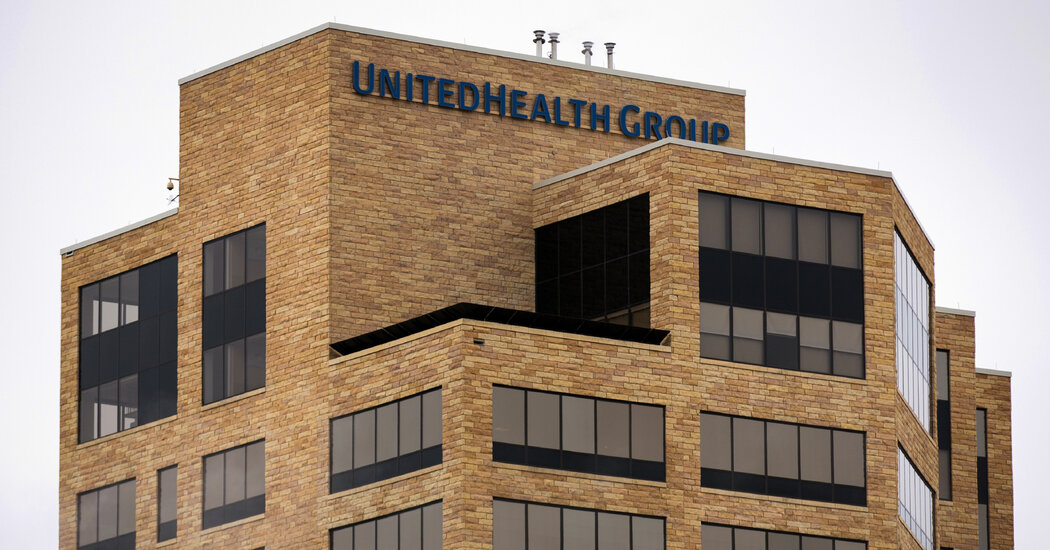UnitedHealth Group, the giant health care conglomerate, said on Tuesday that it continued to struggle with the higher-than-anticipated costs to provide medical care to patients, reporting a drop in earnings for the quarter ended June 30.
While UnitedHealth remained profitable, its operating earnings for the three months fell sharply to $5.2 billion from $7.9 billion in the same period of 2024. Revenues, however, increased to $111.6 billion for the three months of 2025, compared with $98.9 billion for the same period of 2024.
The increased costs were felt across the company’s vast health operations, including one of its most successful businesses, selling private Medicare plans as an alternative to traditional Medicare. UnitedHealth owns the nation’s largest health insurer, UnitedHealthcare, which covers 50 million people.
“The American health system’s longstanding cost problem is accelerating,” Tim Noel, the head of the company’s health insurance business, said on a call with Wall Street analysts after the earnings figures were released. “We are embracing our responsibility to continue to drive better health outcomes while trying to keep health care affordable for all Americans.”
The conglomerate owns an assortment of health care businesses, including surgery centers, a vast network of medical practices and a big pharmacy benefit manager, as well as health insurance plans. In the earnings report, released before the stack market opened, UnitedHealth officials offered a detailed look at the company’s rising medical expenses. Executives emphasized the significant gap between what the company had anticipated it would cost to care for the patients enrolled in its plans and seen by its doctors in its Optum Health network and the actual expenses it is currently facing. The gap was particularly stark in its private Medicare business, called Medicare Advantage.
In addition to selling Medicare Advantage plans, UnitedHealth is a large supplier of plans offered by employers to their workers. The company also sells health plans available through the Obamacare insurance markets and Medicaid.
Other insurance companies have also reported rising medical costs and disappointing profits. Last Friday, Centene, a for-profit insurance company that focuses mostly on patients who are enrolled in Medicaid and Obamacare plans, was the latest insurer to blame rising expenses for poor financial results.
On the call with analysts, which lasted for roughly an hour and half, Stephen Hemsley, UnitedHealth’s chief executive, acknowledged the company’s missteps. “We have made pricing and operational mistakes and others as well,” he said. “They are getting the needed attention.”
In discussing the company’s Medicare operations, Mr. Hemsley described what he called “a generational pullback in Medicare funding,” largely the result of a crackdown in what regulators viewed as overbilling by the insurers for certain health conditions.
In addition to its intention to increase its prices, UnitedHealth said it planned to discontinue some of its plans and would most likely shift to selling plans that give patients a narrower choice of hospitals and doctors as a way of controlling costs.
The company said it would also consider pulling back in other markets, including the sale of Obamacare plans. If Congress does not extend the federal subsidies that bring down the price of these plans for many Americans, the people who do sign up could be costly to cover because many younger, healthier people are likely to forgo coverage.
UnitedHealth’s stumbles, which became evident earlier this year, shocked many of its investors who have come to rely on steady increases of profits from the conglomerate. Since November, the company’s stock has lost roughly half of its value, and the shares had fallen in price earlier in the day.
UnitedHealth has experienced a series of calamities over the last two years, including the murder of the chief executive of its insurance operations, Brian Thompson. Investors have lost confidence in the company’s business model, and patients have grown increasingly frustrated with its methods. In May, it abruptly replaced its chief executive, Andrew Witty, with Mr. Hemsley, who had stepped down from the position in 2017.
Last week, the company confirmed the Department of Justice was investigating its Medicare operations.
Mr. Hemsley took steps to reassure investors. “I feel strongly we can overcome these challenges –- as we have done before,” he said.
The company, which had withdrawn its profit outlook for the year, provided investors with an estimate of what it expected to earn for 2025. It estimated revenues of slightly under $450 billion with net earnings of at least $14.65 per share. The company said it expected to return to earnings growth in 2026.
In his remarks to analysts, Mr. Hemsley said the company had the opportunity to “reposition our enterprise as a far more modern, reliable, consumer and provider friendly enterprise using new technologies and approaches, and we are going to pursue that course,” he said.
Reed Abelson covers the business of health care, focusing on how financial incentives are affecting the delivery of care, from the costs to consumers to the profits to providers.
The post UnitedHealth’s Profits Fall as Costs of Care Continue to Rise appeared first on New York Times.




